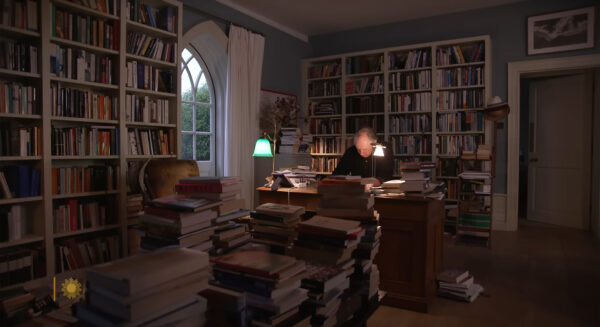Years ago, on a trip to England, I visited the Globe Theatre where an actor recited Shakespeare’s words in their original pronunciation. Until then, I had no idea how different the same words sounded in Shakespeare’s time. Remarkable. (Via Kottke.)
video
Ian McEwan interviewed
Gay Talese on Writer’s Block
This is exactly how I feel.
Jonathan Haidt explains our contentious culture
From BillMoyers.com
Procrastination is thinking
“You call it procrastinating, I call it thinking.”
Aaron Sorkin
“Procrastinating is a vice when it comes to productivity, but it can be a virtue for creativity. What you see with a lot of great originals is that they are quick to start but they are slow to finish.”
Shakespeare’s speech on immigrants
Sir Ian McKellen delivers a stirring speech written by Shakespeare but never performed in his lifetime, as the play was banned by the Queen’s censor. Here, Sir Thomas More confronts a mob in London on May 1, 1517, as they riot and attack immigrants. (For more on the play and the historical background, look here.)
Grant them removed, and grant that this your noise
Hath chid down all the majesty of England;
Imagine that you see the wretched strangers,
Their babies at their backs and their poor luggage,
Plodding to the ports and coasts for transportation,
And that you sit as kings in your desires,
Authority quite silenced by your brawl,
And you in ruff of your opinions clothed;
What had you got? I’ll tell you: you had taught
How insolence and strong hand should prevail,
How order should be quelled; and by this pattern
Not one of you should live an aged man,
For other ruffians, as their fancies wrought,
With self same hand, self reason, and self right,
Would shark on you, and men like ravenous fishes
Feed on one another.…
You’ll put down strangers,
Kill them, cut their throats, possess their houses,
And lead the majesty of law in lyam
To slip him like a hound. Alas, alas, say now the King,
As he is clement if th’offender mourn,
Should so much come too short of your great trespass
As but to banish you: whither would you go?
What country, by the nature of your error,
Should give you harbor? Go you to France or Flanders,
To any German province, to Spain or Portugal,
Nay, anywhere that not adheres to England,
Why, you must needs be strangers. Would you be pleas’d
To find a nation of such barbarous temper
That breaking out in hideous violence
Would not afford you an abode on earth.
Whet their detested knives against your throats,
Spurn you like dogs, and like as if that God
Owned not nor made not you, nor that the elements
Were not all appropriate to your comforts,
But charter’d unto them? What would you think
To be thus used? This is the strangers’ case
And this your mountainish inhumanity.
